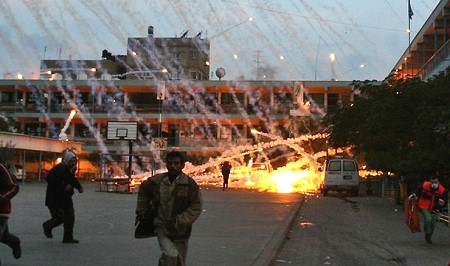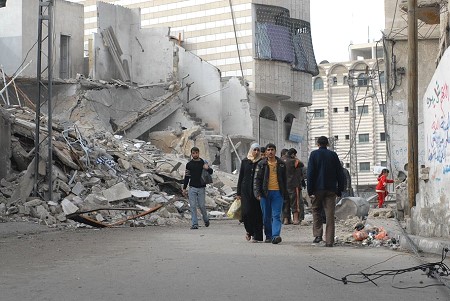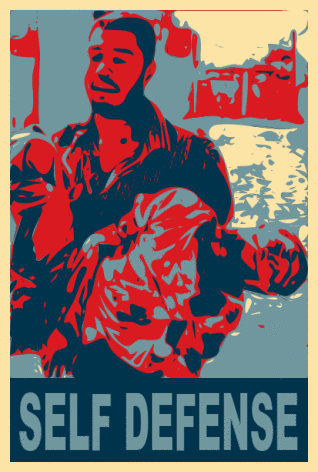In the Times, there’s a brief outline of the problems associated with bringing Israeli war criminals to justice:
The regulations covering alleged war crimes are complex, carefully worded and restrictive. The International Criminal Court (ICC) in The Hague does not appear to have jurisdiction in Gaza because the Israelis are not signatories to the Rome statute that set it up.
However, individuals and nongovernmental organisations from nations that are signed up can make a case to the ICC; and the United Nations Security Council can also pass a resolution calling for a war crimes investigation, as it did over alleged genocide in Darfur. In terms of the ICC statute, the use of white phosphorus could be governed by Article 8(2)(b) under which a war crime is potentially committed if weapons, including projectiles (shells), are launched “to cause superfluous injury or unnecessary suffering or which are inherently indiscriminate in violation of the international law of armed conflict”.
It is up to Luis Moreno-Ocampo, the ICC chief prosecutor, to decide whether the allegations fall into line with the Rome statute definitions. Killing civilians is not a war crime in itself, unless there is an intentional attack directed against noncombatants or an assault is launched on a military objective “in the knowledge that the incidental civilian injuries would be clearly excessive in relation to the anticipated military advantage” – this is the principle of proportionality. In the case of allegations against British troops in Iraq, the ICC prosecutor decided the relevant criteria for starting a formal investigation had not been satisfied.
In the case of Darfur, it was alleged that thousands of civilians had been wilfully killed by the Janjawid rebels. Israel has always insisted that its aim was to target Hamas fighters, not Palestinian civilians.
Juan Cole covers the potential for war crimes tribunals and Israel’s flailing attempts to protect their barbarous soldiers from prosecution:
Israeli politicians and military commanders are being urged to consult counsel before they travel in Europe, where some courts assert universal jurisdiction and where war crimes cases are being filed against Israeli leaders. In 1998, a London court ordered the arrest of Chilean dictator Gen. Augustino Pinochet, who had butchered thousands of community activists, asserting universal jurisdiction. Governments have attempted to reduce the prerogative of courts in this regard, but apparently there are loopholes in the current British legislation that would allow an Israeli leader or officer to be arrested if they journey to the UK. Ynet observes, “The Israeli. . . claim that Hamas has been using women and children as human shields never really took, said a source. Whenever it was used the response was the same: If you know that . . . women and children [were] there – hold your fire.”
Defense Minister Ehud Barak is setting up a legal defense of Israeli troops from potential war crimes prosecutions. Barak pledged that Israeli soldiers would not have to worry about prosecution: “The soldiers did not embark on a private operation . . .We will give them out full support.” It is ironic that an Israeli defense minister seems unaware that the Nuremberg trials established the principle that following orders is no defense for a soldier charged with atrocities.
Even as Israeli Foreign Minister Tzipi Livni visited Brussels, human rights organizations in Belgium were (wholly unrealistically) petitioning a court to have her arrested. However impractical the legal move, it was a humiliation for Tzipi.
The right-Zionists are always asking why Israel is held to a different standard. It isn’t. it appears to be being held to the same standard as Augusto Pinochet and Slobodan Milosevic. It isn’t very nice company to be in, and many Israelis are deeply ashamed of what was done and demanding Israeli investigations of war crimes.
Disturbingly, Livni seems to have influenced some EU countries to back off on condemning Israel for its attacks on UN schools and other facilities.
Germany, Italy, the Netherlands and Romania are opposed to condemning the shelling of UN Relief and Works Agency infrastructure and do not want the EU to call for an international investigation of alleged war crimes by both Israel and the Hamas governors of Gaza, according to sources close to discussions amongst EU diplomats.
At the other end of the table, a coalition of five member states, Belgium, Cyprus, Greece, Ireland and Sweden, is demanding that the bloc call for an international investigation in its conclusions to come out of a meeting of EU foreign ministers next week.
Other member states however do not support this position. Despite UK Prime Minister’s earlier strong words condemning Israel’s shelling of the UN headquarters in Gaza as “indefensible”, London is reportedly reluctant to back the five as it could set a dangerous precedent for its own military operations elsewhere.
The five have, however, managed to win language on the need to “respect and comply with obligations under international humanitarian law” into the draft text, which was not in the initial version of the document.
France meanwhile backs accountability for the attacks on the UN, but is working to achieve this “behind the scenes”, rather than through a statement by EU foreign ministers.
Livni exonerates her terrorist state from blame:
“The difference between Israel soldiers and the terrorists in Hamas is that we are acting against terror, trying to avoid any kind of civilian casualties, while these terrorists are looking, aiming and targeting civilians as part of their ideology.”
“I would like to be judged by the international community according to the same values by which the international community is working,” she continued. “There is a huge difference in any legal system … between a murderer and someone who kills by mistake.”
After visiting the ruins of the UNRWA compound in Gaza, UN Secretary Ban Ki-Moon on Tuesday (20 January) called for those responsible for bombing UN-run buildings and schools in Gaza to be held accountable.
“There must be a full investigation, a full explanation to make sure it never happens again. There should be accountability through a proper judiciary system,” he said.
Despite Israel’s insistence that the UN buildings were not targeted, UN officials have said that they furnished Tel Aviv with GPS co-ordinates of all their buildings.
Czech foreign minister Karel Schwarzenberg, whose nation currently chairs the EU’s six-month rotating presidency, said he trusted the Israeli court system mount a prosecution, rather than the International Criminal Court.
“I have heard the declaration of the UN secretary-general, but to tell you the truth, we consider Israel a democratic state, where the rule of law exists, so of course, in the case of such a criminal act, which can happen in any state, especially during the course of war,” he said, “then the Israeli prosecutor would take the steps that are necessary and then to a court where the case will be decided.”
“The ICC is only a last resort if a country itself doesn’t bring forward a case, [and] we are relying on the Israeli courts and the work of the prosecutor there.”
In view of Obama’s differentiated foreign policy, Livni illustrates she is living in the comfortable black and white Bush past:
She did however warn against opening direct dialogue with the Gaza government, calling on Europe to “continue to delegitimise Hamas.”
Some EU ministers, notably Finnish foreign minister Alexander Stubbs, have said that such dialogue may be necessary.
Ms Livni said: “What is needed is a coalition against terror and not something that ends by an agreement with them.”
White phosphorus links:
Israeli army investigates use of white phosphorus in Gaza
Amnesty International has accused Israel of war crimes over its use of highly incendiary munitions in heavily-populated areas.
“Amnesty International delegates visiting the Gaza Strip found indisputable evidence of widespread use of white phosphorus in densely-populated residential areas in Gaza City and in the north,” the organisation said.
“We saw streets and alleyways littered with evidence of the use of white phosphorus, including still burning wedges and the remnants of the shells and canisters fired by the Israeli army,” said Christopher Cobb-Smith, a weapons expert touring Gaza as part of Amnesty’s four-person fact-finding team.
Growing concern over Israel’s weapons use
If the investigation which the Israeli military announced this week into the use of white phosphorous is serious, it will have to examine the events at the Abu Kalima house here in this semi-rural suburb of of Beit Lahiya, among many other locations. It’s unlikely to dwell for long on the fact that the war saw the first use of artillery in Gaza since late 2006.
The military ended it after 18 members of one family were killed by shelling on a civilian house in Beit Hanoun in November 2006.
But it will have to take into account that the Amnesty International have no doubt that the shells which killed the Abu Kalima family contained phosphorus. Nafez al Shaban, the Glasgow and US trained head of Shifa Hospital’s Burns Unit is certain that the bone-deep tissue destruction sustained by Mrs Kalima, her critically injured daughter in law and grandaughter, were caused by it. And finally fragments of the brown spongy substance, with its unpleasantly pungent smell, are still lying in the debris outside the Abu Kalima house.
After a week of ceasefire Israel is facing growing questions not only about phosphorus but what other weapons it used. For the many thousands of Gazan civilians seeking to rebuild their ruined lives the hope that a new US president will be more active in the region than his predecessor still seems barely relevant. And this is not only because of an injury total put by the ministry of health in Gaza at 5,300, or worries about long-term psychological damage to their children. They also face a protracted dispute between Israel, the Ramallah based Palestinian Authority, and much of the international community on the one hand, and Hamas on the other before multi-billion dollar task of reconstucrion can even begin. For most Gazans peace is a return to their previous impoverished life under siege —only worse.
Israeli army probes use of phosphorus in Gaza: report
Depleted uranium:
UN to probe claim Israel used depleted uranium bombs in Gaza
United Nations organizations said yesterday that it will investigate complaints that Israel used depleted uranium projectiles in the course of the fighting in Gaza, causing health and environmental damage.
The inquiry will be conducted by the International Atomic Energy Agency (IAEA), the World Health Organization (WHO) and the Environment Protection Organization, at the request of the Arab states’ UN envoys.
Other illegal weapons:
Israel Admits It Lied Over Missile Raid on Camp
The Israeli military has admitted that it lied about a rocket attack on a Gaza refugee camp, which according to the army led to no casualties, but which the Palestinians have claimed killed 14 civilians.
A leftwing member of the Israeli parliament, Yossi Sarid, forced the confession from the air force chief after he threatened to release evidence that the military had used a weapon more destructive and indiscriminate than it had publicly claimed.
A month ago, the air force launched an assassination strike against a Hamas activist who was driving through Nuseirat refugee camp. The Palestinians claimed that the attack caused a large number of civilian casualties, but the air force commander, Major General Dan Halutz, produced video footage of the car being hit by two missiles that showed no one standing near the wrecked vehicle as the rockets struck.
The military said that Hellfire missiles were used, producing a concentrated explosion over a small area. Gen Halutz likened the effect of the missiles to “two grenades”. The video footage was widely shown on Israeli television.
But the army now admits that it lied in briefings to the Israeli and foreign press, because the second rocket was not a Hellfire missile.
The military refuses to identify the weapon used, on the grounds of “operational security”. But the speculation is that it was an American-made Flechette, which is illegal under international law because it fires thousands of tiny darts over hundreds of meters, causing horrific injuries. Israel has used similar weapons in Gaza in the past.
Indiscrimate disproportionate slaughter:
How IDF legal experts legitimized strikes involving Gaza civilians
War crimes:
War crimes convictions after Gaza?
Israel names justice minister to fight war crime charges
Daniel Friedman will lead an inter-ministerial team to coordinate a legal defence for civilians and the military, the source said.
Israel’s military censor has already banned the publication of the identity of the unit leaders who fought against Hamas Islamists on the Gaza Strip for fear they may face war crimes charges.
UN Secretary General Ban Ki-moon demanded Tuesday that those responsible for bombing UN buildings in the Palestinian territory should be made accountable and accused Israel of using excessive force.
Amnesty International said it was “undeniable” that Israel had used white phosphorus in crowded civilian areas, contrary to international law, charging that this amounted to a war crime.
Eight Israeli human rights groups have called on the Israeli government to investigate given the scale of the casualties, describing the number of dead women and children as “terrifying.”
Richard Falk calls for investigation into systematic Israeli war crimes
The UN Special Rapporteur on human rights in the Occupied Territories, Richard Falk, said he had little doubt about the “unavoidably inhuman character of a large scale military operation of the sort that Israel has initiated… against an essentially defenceless population.”
Falk told journalists that Israeli military operations in the densely populated territory among a population weakened by an 18 month blockade “raises the spectre of systematic war crimes.”
“Unlawful targets have been selected” during the fighting, he alleged.
“The evidence of breaking of fundamental rules of international humanitarian law is so compelling,” he added, backing calls for an independent, international investigation.
Falk, a legal expert, insisted that the Palestinian population of the Gaza Strip was effectively trapped in a war zone and prevented from fleeing, even if they were ill, wounded, or children.
The 47-member UN Human Rights Council voted by a large majority on January 12 to set up a probe into “grave” human rights violations by Israeli forces against Palestinians.
Syria holds an Israeli war crimes exhibition
“Organizing this Exhibition aims to illustrate the massacre committed by Israeli war criminals and to keep them in the memory of the Arab people,” said Khaled Katta, a caricaturist.
A legal seminar was organized and held simultaneously concerning the crimes and massacres perpetrated by Israeli forces on Palestinians in the Gaza Strip.
“We are trying to study an exposed illegal alternative, to take Israeli war criminals to trial at The Hague. Their acts in Gaza are war crimes,” said Ibrahim Drraji, a professor at the University of Damascus.
Israeli legal coverup tactics:
Israel Deploys Lawyers to Head Off War-Crimes Charges
Haaretz Editorial: Investigate Now
Did Israel Use A Banned Weapon?
CBS Evening News: Israel Admits To Using Dangerous Chemical; Says It Violated No Laws


